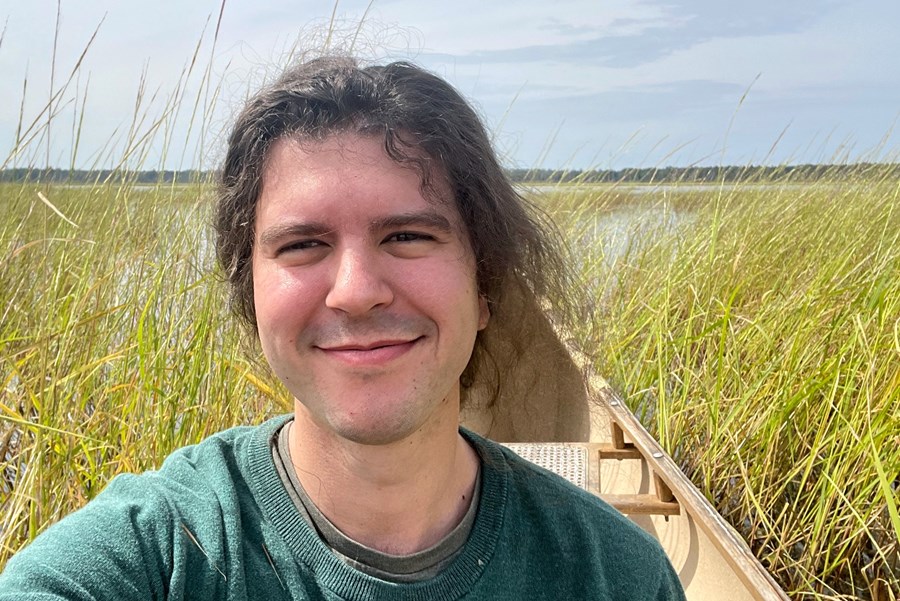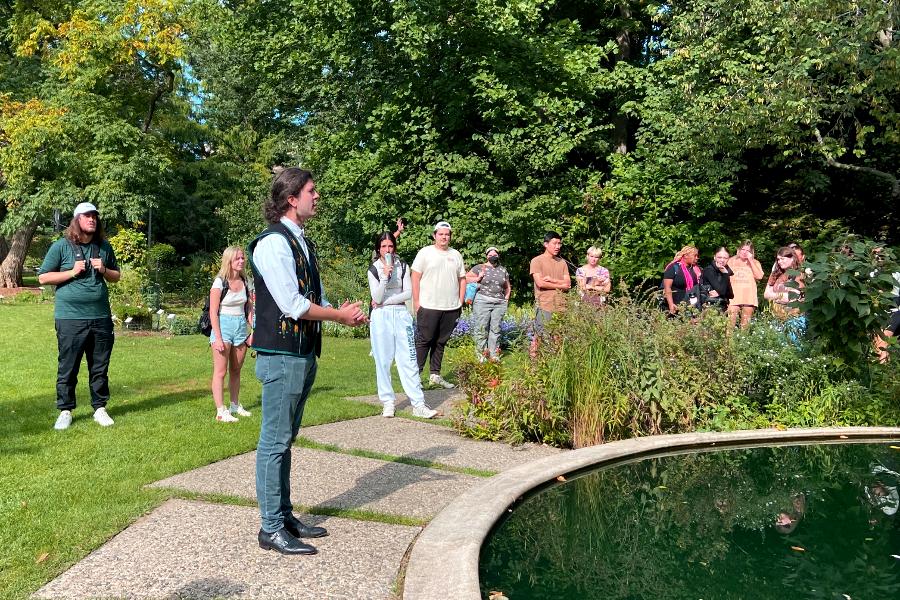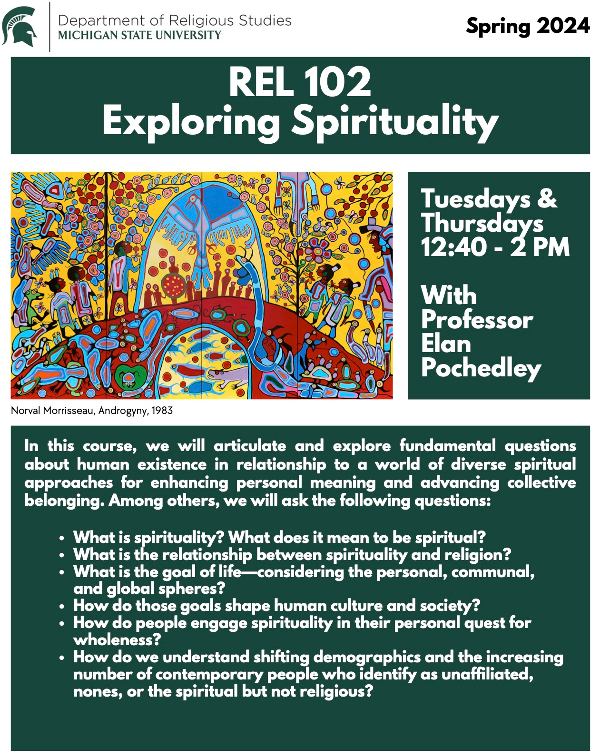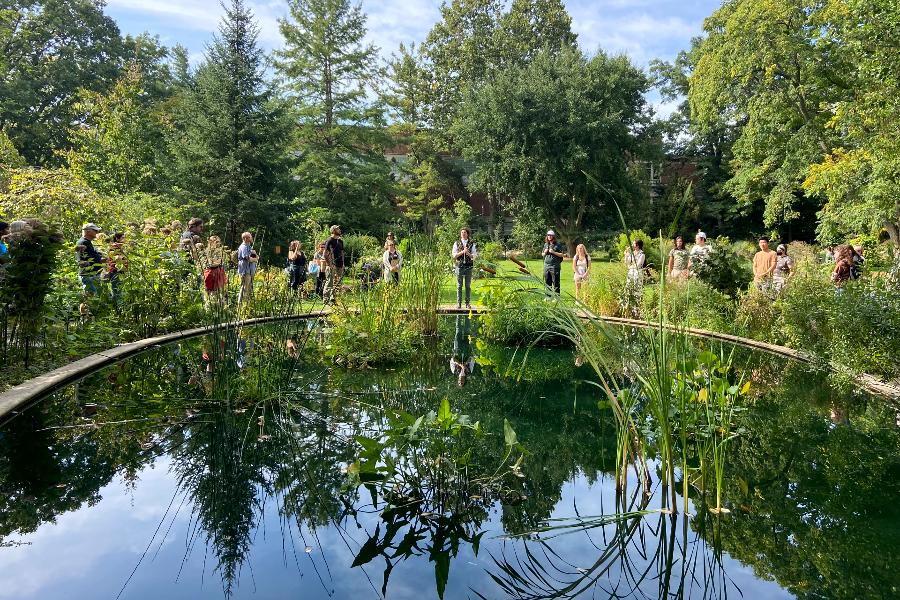Elan Pochedley, Assistant Professor in the Department of Religious Studies at Michigan State University, focuses much of his research and teaching on understanding the sustainable stewardship that Native Americans have demonstrated toward waters, plants, fish, wildlife, and their food systems.
“One thing I’ve brought up in my IAH (Integrative Studies in Arts and Humanities) classes is thinking about how Indigenous peoples frequently get relegated to this idea of the ‘past’ or being ‘primitive,’” Pochedley said. “But that completely dismisses the technological prowess they have inherited and developed, in addition to the very contemporary tools and technologies they bring into their environmental care now.”

Pochedley, a member of the Citizen Potawatomi Nation, joined Michigan State University in the Fall 2023 semester as one of two new faculty members in the Department of Religious Studies to receive an inaugural 1855 Professorship.
Created by the Office of the Provost and named for the year MSU was founded, the 1855 Professorships aim to advance MSU’s Strategic and DEI (Diversity, Equity, and Inclusion) priorities by transforming the impact made on minoritized, marginalized, and underrepresented communities both on and off campus.
The 1855 Professorships in the Department of Religious Studies focus on Great Lakes Anishinaabe knowledge, communities, spiritualities, and cultural practices.
“I’ve always been interested in Anishinaabe/Neshnabé knowledge and storytelling and the way it helps us make sense of the world,” Pochedley said. “The 1855 position is an excellent fit based on my research, and I love being back in this area, having done fieldwork in Michigan in 2019 and continuing that work with folks based here via Zoom during the pandemic.”
Sustainable Anishinaabe Technologies
Pochedley’s research not only focuses on the environmental hardships that Anishinaabe people have endured but also their ability to navigate changing environments so as to continue their practices of care and sustainable ways of living through tools they have adopted or developed. He’s not just interested in Anishinaabe history but in Anishinaabe presences, the ongoing sovereign legal status of Anishinaabe nations, the practice of their rights recognized or reserved under treaty agreements, and their visions of the future.
His scholarly work examines how different Native nations are working towards caring for their local environments and traditional territories through laws, policies, and environmental monitoring. And while certain environments have been lost or dramatically altered by industrial and agricultural practices, his research looks at the ways Native people are participating in ecological restoration projects based on Anishinaabe ethics, practices, technologies, stories, and knowledges.

“The focus on technology is really important because industrialization and environmental change is part of the story about why their foodways and livelihoods are often threatened at this point because of changes to ecosystems, environments, and the habitats their other-than-human relatives rely on,” he said. “But there’s also a rich history of Anishinaabe technologies that go into their harvesting practices, that go into the tools and the knowledges that have sustained our people across generations in this area.”
An example of this is the birchbark canoe and the wild rice harvest. According to Pochedley, the Anishinaabeg have long used a remarkable system to build canoes using pine pitch and roots for binding pieces of birch bark and cedar together. Along with that knowledge of how to build essentially waterproof canoes from trees, they use innovative tools when harvesting wild rice, including certain kinds of forked push poles so as to not disrupt the roots of the rice plant and cedar knocking sticks.
“When we think of innovation and technology, we’re frequently thinking of infrastructures, machines, mechanical instruments, and ideas of progress related to them. But really, if we think about sustainability as a core principle that can guide everyone into a more sustainable future, then that reorients how we think about what is ‘modern’ or future-oriented.”
Connecting MSU and Anishinaabe Tribes
Helping Michigan State University make connections with Anishinaabe tribes also is a key part of Pochedley’s vision for the 1855 Professorship. He currently is working to bring guest speakers to the MSU Museum in Spring 2024 to discuss the history of wild rice harvesting practices and ecological restoration efforts.
“Personally,” Pochedley said, “I’m excited to see future collaborations between the governments and citizens of these Anishinaabe nations and MSU, and being an active partner in research projects that these nations are interested in.”

Also, in the Spring 2024 semester, Pochedley will teach Exploring Spirituality (REL 102), an undergraduate Religious Studies course that will examine Indigenous peoples’ and other communities’ philosophies, traditions, and ways of understanding spirituality.
The course will explore fundamental questions about human existence in relationship to a world of diverse spiritual approaches for enhancing personal meaning and advancing collective belonging.
Among the topics to be covered by the course include the meaning of spirituality, relationship between spirituality and religion, goals of life and how those goals shape human culture and society, how people engage spiritually in their personal quest for wholeness, and the increasing number of people who identify as unaffiliated or spiritual but not religious.
“The idea would be to really orient a class around Anishinaabe understandings of time and movement, and what they have to teach us about environmental ethics and care,” he said. “It would be a great way of thinking about what it means to be a student in this place called Michigan. Thinking about the ways that different people have historically and currently practice these harvesting, fishing, hunting, and sugaring activities that sustain people while respecting their environments and other-than-human relatives.”
Connecting with the Potawatomi People
Pochedley earned his Ph.D. from the Department of Anthropology at the University of Minnesota, where he also received dual graduate minors in American Indian and Indigenous Studies and Heritage Studies and Public History. His research has been supported by the National Science Foundation and the Mellon Foundation, and he recently completed a two-year term as the Charles Eastman Fellow at Dartmouth College.
Although Pochedley loved physics in high school, he majored in Native/Indigenous Studies during his undergraduate years at Columbia University, while also completing internships at his tribe’s Cultural Heritage Center in Oklahoma.

He credits his grandfather for teaching him about what it means to live well, along with the importance of knowing their people’s histories in Michigan and Indiana, traditional homelands of the Potawatomi. The Citizen Potawatomi Nation currently is based in Oklahoma; however, citizens of this nation have intergenerational and ancestral roots in the Great Lakes region.
“Ancestors of the Citizen Potawatomi were violently forced to relocate from the southern Great Lakes region to Kansas in the 1830s. Then many Potawatomi families would subsequently move to Oklahoma where the Citizen Potawatomi Nation is now based, which is reflected in treaty agreements made in the 1860s,” Pochedley said. “When I was growing up in northeast Ohio, my grandfather would take me to Michigan for Potawatomi events. I remember going to the Gathering of Potawatomi Nations and folks from all of the Potawatomi nations across Turtle Island were there. Those were fantastic experiences and great opportunities to come together where I got to meet all these people, not just from my own nation, but from throughout the Great Lakes region. That was one of the earliest ways I would visit with Potawatomi (Neshnabé) people outside of my immediate family and learn from them.”
“I’m deeply grateful to have had the experience of working with those sovereign nations, with their citizens, and with personnel from their respective environmental and cultural departments,” Pochedley said, “and having conversations with these folks to understand contemporary Potawatomi and Ojibwe ethics, obligations to other-than-human relatives, and expressions of environmental care.”
More on 1855 Professorships
MSU’s Office of the Provost announced the creation of the 1855 Professorships in Fall 2021 and asked for proposals for these full-time, tenure-stream positions. Altogether, 76 proposals were submitted from across the university with every college participating. A competitive review process by a committee of scholars and administrators led to the selection of 13 proposals, including the proposal from the Department of Religious Studies.
The Religious Studies Department originally was awarded one 1855 Professorship. But when they received two exceptional applicants, the decision was made to fund two 1855 Professors. One position is being funded by the Office of the Provost and the other by the College of Arts & Letters.

Together, the 1855 Professorships are reimagining MSU’s foundational land-grant mission to elevate the pursuit of practical knowledge and broaden educational access by supporting inclusive excellence with scholarship and public engagement.
For more information on the 1855 Professorships in the Department of Religious Studies, see the previous article that was published by the College of Arts & Letters, titled “Department of Religious Studies Awarded Inaugural 1855 Professorships.”
This story originally appeared on the College of Arts and Letters website.